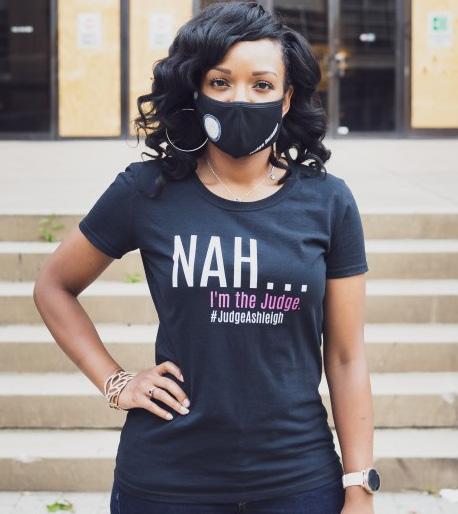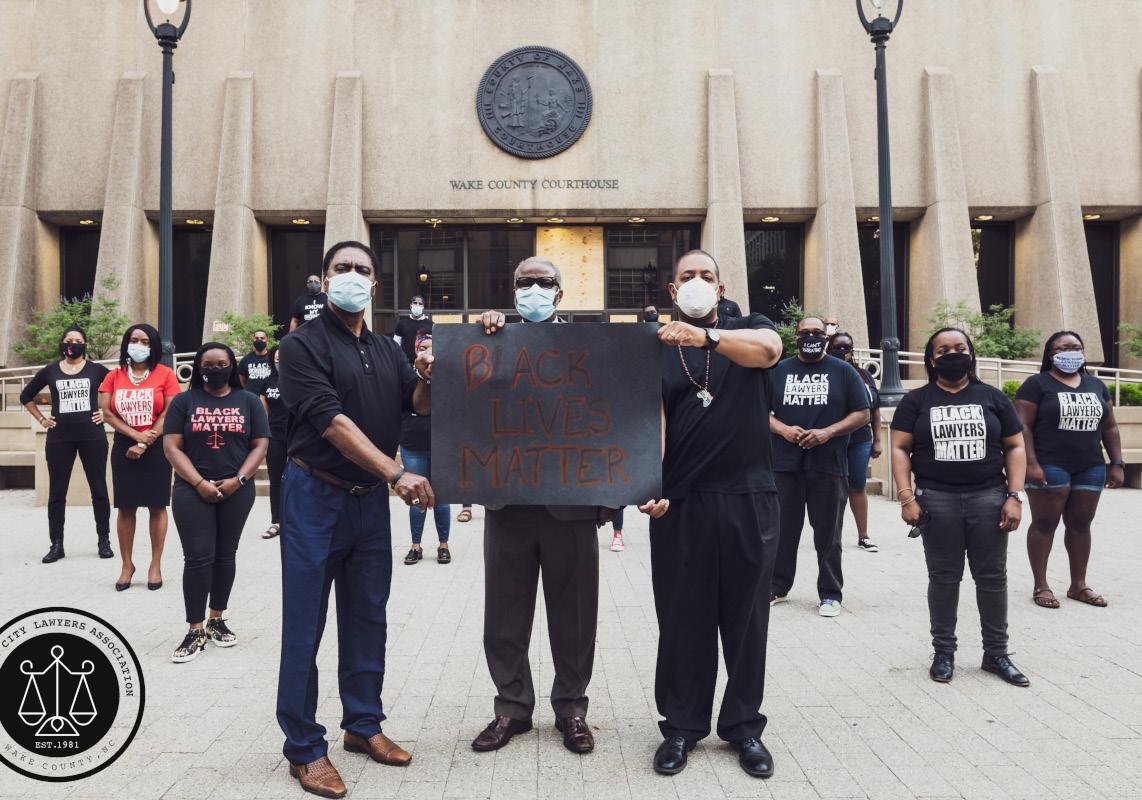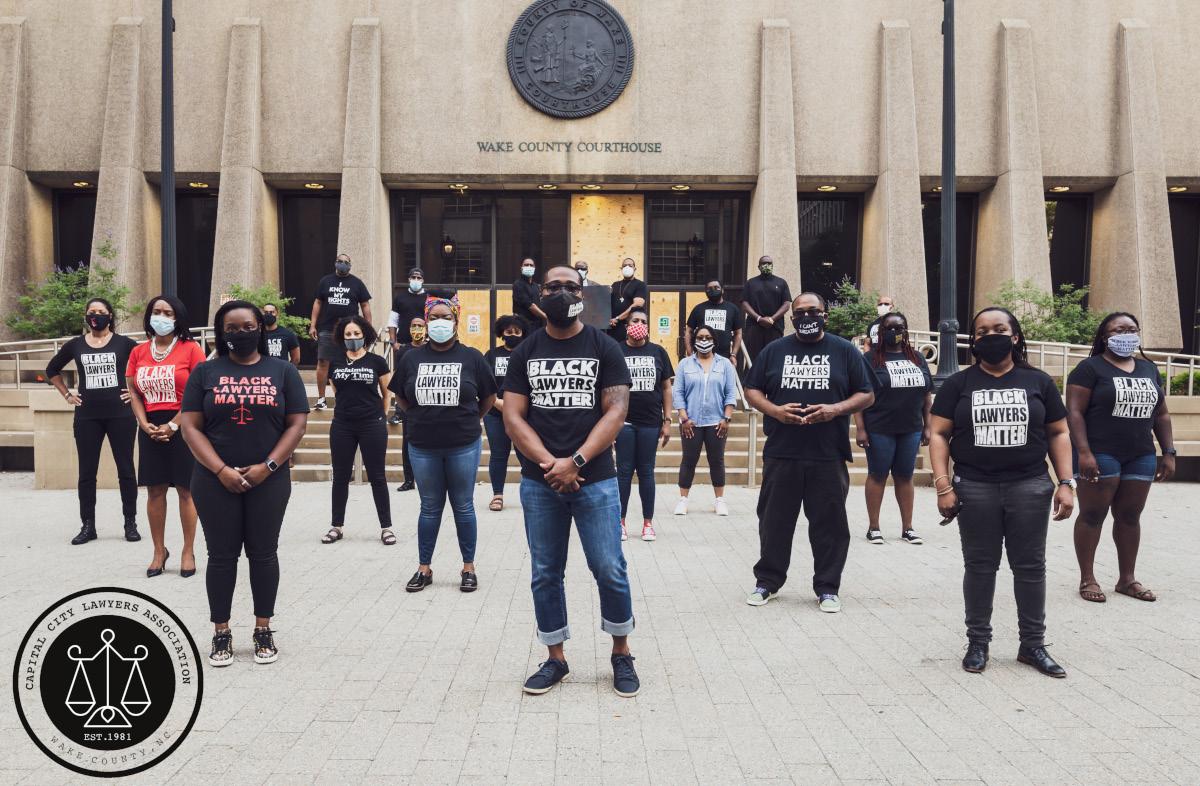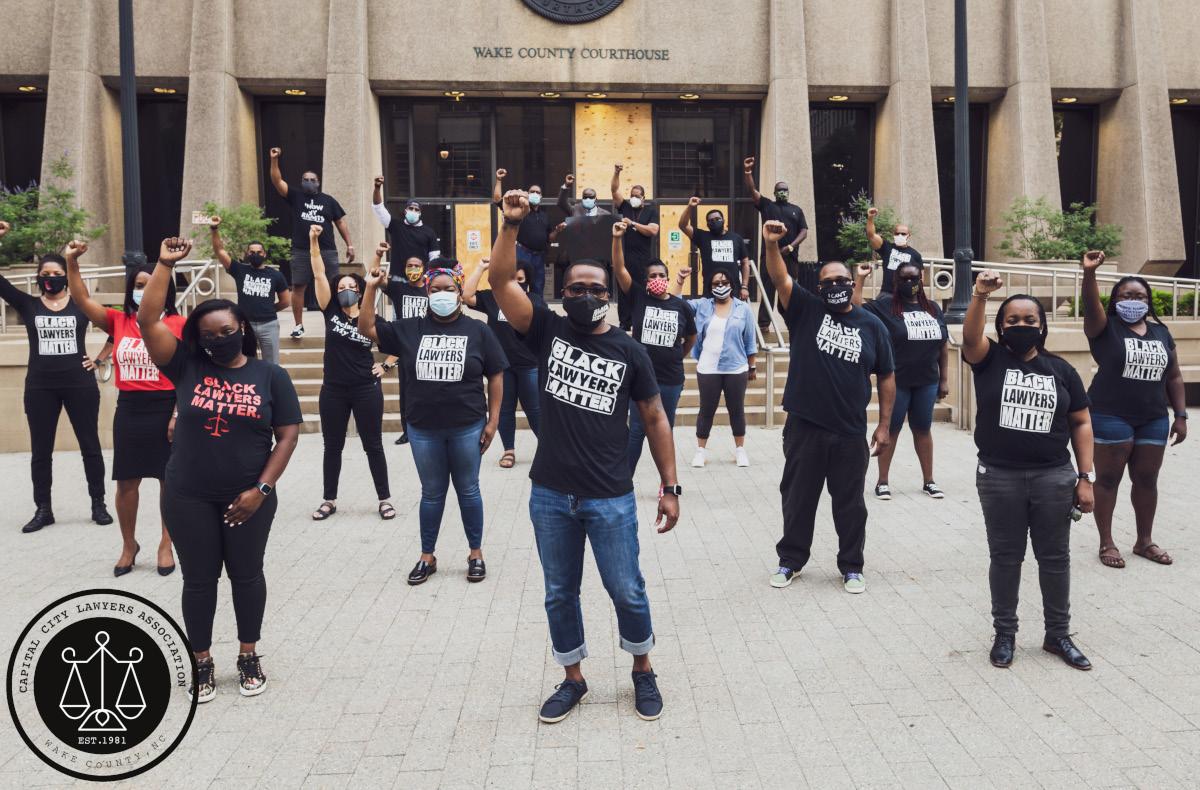
13 minute read
JUSTICE ISN'T ALWAYS BLIND
JUSTICE ISN’T ALWAYS BLIND
RACISM IS A PREVALENT ISSUE IN OUR COURT SYSTEM, EVEN AS A LAWYER
Advertisement
BY JUDGE ASHLEIGH P. DUNSTON | WAKE COUNTY DISTRICT COURT
JUDGE ASHLEIGH P. DUNSTON

AS WE NAVIGATE THIS NEW WORLD OF MASKS, social distancing and quarantines, we are constantly reminded that there is a silent virus lurking that could infect each of us differently. Some people are asymptomatic, others are hospitalized, and at the time of authoring this article, more than 126,000 people have lost their lives in the US alone. 1
Similar to COVID-19, there’s another virus that has existed for more than 400 years and has been exposed more prevalently in recent months and years that can no longer be ignored or swept under the rug. This virus is called systemic racism.
This virus not only affects Black people involved as parties in the criminal justice system, in obtaining housing, education, healthcare and employment opportunities, but it is pervasive within our legal profession as a whole. So many times, we as attorneys pretend that we’re immune to instances of racism because of our education, background or experiences. Some of us even go so far as to say that we don’t “see color.” However, to not “see color” is as much of a farce as it is to say that racism isn’t a thing that we should be concerned about because it hasn’t affected us directly. 2 This form of micro-invalidation is hurtful and suppresses the experiences of our Black colleagues, such as these.{These stories have been edited for brevity, clarity, and, in some cases, to protect the victims.}
“As a rookie prosecutor in the late 1970’s, I quickly learned how to deal with one of the most racist judges I would ever encounter. Not only would this judge slap his .45 caliber handgun down on the bench, but once he even hung a hangman’s noose in front of the bench during a murder trial. It didn’t take long for me to notice a pattern when I had to appear before him. If I were prosecuting a white person, he would either find a way to dismiss the charge, continue the case, or find an excuse to not impanel a jury for trial. Most of the time, he wouldn’t even look in my direction unless he just absolutely couldn’t help it.”
“I had only been at the DistrictAttorney’s Office for a month when a defense attorney came into the courtroom telling me that anotherADA had made a deal on a previous court date. I informed him that I didn’t feel comfortable dismissing the case because I was new, but that he could take the file to another courtroom and ask thatADAto dismiss it.As he was leaving out of the side door, he called me a ‘f*cking n*gger.’ I confronted him and told him that I heard what he said. I knew that I couldn’t do anything because I would be fired for reacting, so I had to swallow my pride and continue to handle my docket. I’ve continued to have to work with this individual who has yet to apologize.”
“Awhite female judge would routinely ask my white male colleagues in open court during a hearing whether I was right on the law regarding legal arguments I made. She never asked me whether my white male colleagues were correct on the law — it was just presumed they were correct. In my worst hearing with this judge, my white colleague agreed that I was right on the law and she still refused to believe me. When she refused to allow my clients to speak, which was their constitutional right, I withdrew. She appointed the white attorney, and he represented the clients at the hearing the next week when I had secured leave.”
“As a private DefenseAttorney, I represented anAfrican American female with a DWI and reckless driving charge. After she was found not guilty of the DWI by anAfrican American Judge, we decided to appeal the reckless driving charge due to ramifications with her employer. The original Assistant DistrictAttorney told me that my client could do community service to have the case dismissed; however, a different Assistant District Attorney stated that I was ‘handed a gift’with the not-guilty of the DWI and that the offer was no longer on the table. The reckless driving charge was set in Superior Court and continued multiple times, causing my client to continuously have to take off work. My client ended up having to plea to a reduced charge and pay court costs, whereas, other cases involving white Defendants would have been dismissed.
“In the late 1990s, I worked briefly as the only BlackAssistant DistrictAttorney in a small rural county. I dismissed a case for lack of evidence, due to an officer improperly charging a young, black youth without probable cause. The officer went to my supervising attorney who stormed into the courtroom, demanded to know what happened, and attempted to shame me publicly by saying that he could have prosecuted that case blindfolded with his hands behind his back. I believe he felt comfortable doing this because of my race. This supervising attorney went on to become an appellate judge.”
“When I first started practicing, I walked behind the courtroom to go in a side door and check the docket.Adeputy chased me down the
1 Centers for Disease Control and Prevention. 2020. Coronavirus Disease 2019 (COVID-19) In The U.S.. [online] Available at: https:/www.cdc.gov/coronavirus/2019-ncov/ cases-updates/cases-in-us.html [Accessed 1 July 2020].W 2 Vincenty, S., 2020. Being Color Blind Doesn’t Make You Not Racist—In Fact, It Can Mean The Opposite. [online] Oprah Magazine. Available at: <https://www.oprahmag. com/life/relationships-love/a32824297/color-blind-myth-racism/>.


hallway and told me that this area was for attorneys only. When I told him I was an attorney, he did not apologize, but instead, just walked into the courtroom as if nothing happened. Mind you, I was in a suit and had my files with me. This is only one of many times that I have been told that I could not be somewhere or sit somewhere because I was not an attorney. In 2020, the assumption remains that if you are a person of color that is dressed up in a courtroom, you are the Defendant or a litigant.”
“When I was a young lawyer, I was working with a team of well-respected criminal defense attorneys. While out for an evidence viewing at the Sheriff’s Department, we were joined by law enforcement and the District Attorney prosecuting the case. I was the only black person in our group. After the evidence viewing, which I had remained silent at, we were all walking out of the Sheriff’s Office and there was a large chicken plant directly across the street. The District Attorney, addressed me for the first time, pointed at the plant, and remarked, ‘Hey, if this law thing doesn’t work out for you, you can always go get a job over there.’ The only response I could muster was a depressed and broken chuckle while everyone else joined in a laugh.”
“At my first District Court Judge’s Conference following my 2008 election to the bench, a white female colleague from another county said, ‘Honey, can ya get us some more napkins?’ I replied, ‘No.’”
“I was applying for a job as an Assistant Public Defender. During the interview, the attorney in charge of hiring was making typical small talk. He asked what I did over the weekend. I told him that I had gone to visit my brother in Raleigh. His immediate response was, ‘So how is Central Prison?’ I just sat shocked and uncomfortably laughed. I’ve never been more thankful for not getting a job.”
“When I was a new attorney, I practiced in an area where I was the only minority person in the entire District. Every week, I was constantly referred to as the ‘social worker.’ A white client told the judge that she didn’t know how she ended up with me as an attorney, but that she couldn’t afford the white male attorney she wanted.”
“I am an attorney who has done indigent defense for years. I have 15 years of experience which includes working for the Public Defender’s Office with extensive trial experience. I applied for another position doing the same thing and was offered a very low amount for the position. I had knowledge that a white female was recently hired for a similar position, with no experience, and given more pay than I was offered. When I asked for a higher salary, he stated in an indignant tone that, ‘the offer was reasonable based upon my experience.’ I declined the offer.”
“As an attorney, I’ve been stopped at the ‘bar’ and been told by bailiffs that only lawyers and court personnel can come any further. Although I’ve complained, nothing has been done about my treatment or likely the treatment of other lawyers who ‘look’ like me.”
“I’m a civil litigator and handle cases across the state. After being accosted by the bailiff when trying to enter the bar, the judge questioned me heavily about my case although it was a Motion for Final Judgment and no one answered the complaint or appeared from the other side. The judge did not question any other attorneys as much as I was questioned nor did the judge spend as much time reviewing any other court files as he did mine. The judge eventually signed my order and I headed back home, but I still remember how disheartened I felt as I left that courthouse. Other non-Black attorneys were treated courteously and taken at their word, meanwhile, I was treated like an incompetent outsider. It’s been years and the memory of this incident still stings.”
“I worked for an office where the intake staff was hesitant to ask clients how they identify racially, so they thought the better option was to assign race based on how clients sound on the phone. They freely shared this and couldn’t understand why this was a big deal to me.”
“An assistant clerk of court said to me ‘So, who’s girl are you?’ (thinking I worked for an attorney).” “As a new judge, I was assigned Court in a smaller county in NC. I arrived at work with my robe draped over my arm and greeted the deputies. After holding court for the morning session, we

took our customary lunch break. I left for lunch and returned to the courthouse and decided to make some phone calls. I was parked in the assigned spaces for judges. At that time one of the deputies came outside and tapped on my window and told me that,‘I could not park here because these spaces were reserved for judges only.’ I replied that, ‘the last time I checked I was a judge, but moreover you saw me this morning.’ She looked and I looked, then she replied ‘oh’ and walked away. She never apologized, but I realized that she couldn’t conceive that I could even be a judge.”
Chief Justice Cheri Beasley of the North Carolina Supreme Court said it best:
Too many people believe that there are two kinds of justice. They believe it because that is their lived experience -- they have seen and felt the difference in their own lives. The data also overwhelmingly bears out the truth of those lived experiences. In our courts, African-Americans are more harshly treated, more severely punished, and more likely to be presumed guilty… We must come together to firmly and loudly commit to the declaration that all people are created equal, and we must do more than just speak that truth. We must live it every day in our courtrooms. 3
Much like across the nation, your Black colleagues and colleagues of color are being affected and to do nothing is no longer an option. Despite obtaining the same degree and passing the same bar, due to our skin color, we are held to different standards, scrutinized at higher levels, seen as illegitimate and “given” our titles due to affirmative action. Our judgment and competency is always questioned.
And why does that matter? There are personal and professional ramifications to consider. On a personal level, this discriminatory behavior is demeaning, insulting, dangerous and normalizes inequality among equal individuals. Furthermore, this disparate attitude and treatment towards our colleagues of color impacts not just our development as a lawyer and confidence to seek higher positions, but also affects the potential outcomes that can be achieved for the clients served. 4
This last point raises professional concerns for this behavior. In addition to our colleagues suffering from this unacceptable behavior, our clients suffer due to the unequal, detrimental treatment of their lawyers. The very trust that we ask the public to place in the justice system is threatened and made weaker with each instance of discrimination experienced, witnessed or learned of by the public.

The Preamble to the Rules of Professional Conduct charges lawyers to “(6) further the public’s understanding of and confidence in the rule of law and the justice system because legal institutions in a constitutional democracy depend on popular participation and support to maintain their authority.” 5 How can the public feel confident in the justice system if the primary participants in that system are often treated unequally based upon the color of their skin?
However, there is hope! Much like the preventative actions that we take daily to curb the spread of COVID-19, we must do the same to eradicate racial disparities. It’s extremely important that we begin to understand that the legal profession is not immune to instances of racism, neither explicit nor implicit, and it’s time to educate ourselves so that we can all exemplify the highest level of professionalism and competency.
We must take an inner look at ourselves and our beliefs, then outwardly work to facilitate those changes. We must educate ourselves on the plight of others, correct
3. Nccourts.gov. 2020. Chief Justice Beasley Addresses The Intersection Of Justice And Protests Around The State | North Carolina Judicial Branch. [online] Available at: <https://www. nccourts.gov/news/tag/press-release/chief-justice-beasley-addresses-the-intersection-of-justice-and-protests-around-the-state>. 4. Weiss, D., 2020. Majority Of Minority Female Lawyers Consider Leaving Law; ABA Study Explains Why. [online] ABA Journal. Available at: <https://www.abajournal.com/news/article/ most-minority-female-lawyers-consider-leaving-law-aba-study-explains-why>. 5. Preamble: A Lawyer’s Responsibilities | North Carolina State Bar. [online] Available at: <https://www.ncbar.gov/for-lawyers/ethics/rules-of-professional-conduct/01-preamble-alawyers-responsibilities/>. WAKE BAR FLYER


colleagues who say improper things and act inappropriately, check our implicit biases and be willing to have difficult and uncomfortable conversations. 6
Additionally, we can work on tangible things to prevent further instances of this behavior in our Bar. One way is to advocate for a mandatory bias/diversity/inclusion CLE requirement to be conducted on a semi-annual basis. Another way is to advocate for our State Bar to adoptABA Model Rule 8.4(g) that renders it misconduct for an attorney to:
. . . engage in conduct that the lawyer knows or reasonably should know is harassment or discrimination on the basis of race, sex, religion, national origin, ethnicity, disability, age, sexual orientation, gender identity, marital status or socioeconomic status in conduct related to the practice of law. This paragraph does not limit the ability of a lawyer to accept, decline or withdraw from a representation in accordance with Rule 1.16. This paragraph does not preclude legitimate advice or advocacy consistent with these Rules. 7
I know that we will all rise to the call of action to make the necessary changes to our lives and profession. Our colleagues, clients, the future generation of lawyers and the general public are depending on us to do everything we can to prevent the spread of racism. WBF







